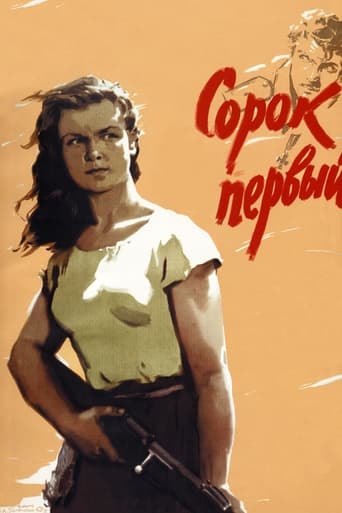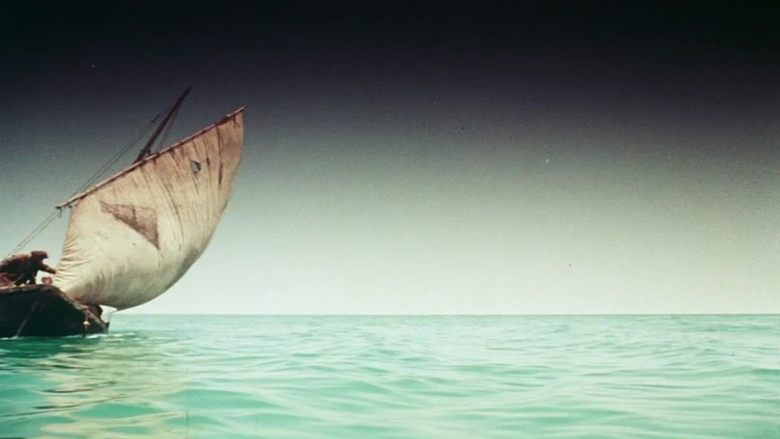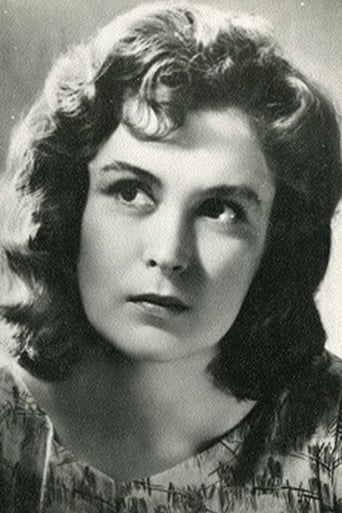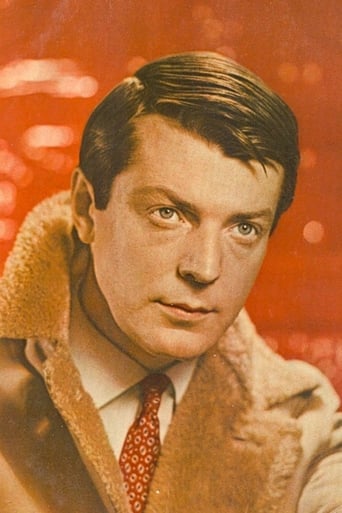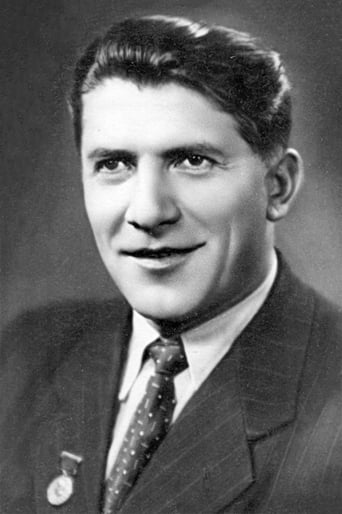The Forty-First (1956)
An unexpected romance occurs for a female Red Army sniper and a White Army officer.
Watch Trailer
Free Trial Channels
Cast


Reviews
Just perfect...
Excellent, a Must See
I think this is a new genre that they're all sort of working their way through it and haven't got all the kinks worked out yet but it's a genre that works for me.
This film is so real. It treats its characters with so much care and sensitivity.
Taking place during the Russian Revolution this movie focuses on a female sniper, Maria Filatovna, who is fighting for the Red Army and Vadim Govorkha, who is fighting for the White Army. As the movie progresses they eventually form a deeper relationship when they are stranded on an isolated island after their boat is capsized in a sudden storm on their way to the Red Army headquarters. However, this changes when at the end of the movie a boat approaches their island carrying White soldiers. As Vadim goes to rejoin them Maria shoots him in the back, and finally claims her forty-first kill.The ending of this movie was surprising, but overall not unexpected. This film is obviously propaganda and there is not much that hides that fact. There are many shots within this film that speak to this fact, one of them being the opening shot in which the soldiers faces are indistinguishable from each other as they traverse through the desert, which helps emphasize the unity of the Red Army troops. The portrayal of both the Red and White Armies also emphasizes the propaganda element of the film. The Whites are portrayed as the classical bourgeois oppressors that care only for themselves, while the Reds are portrayed as the underdogs who are fighting for the people. The wide sweeping shots of the desert establish the difficulties that the Red Army is fighting against, not just in the form of the environment, but in the form of the ideals as well. However, the most dramatic scene that speaks to this being propaganda is the choice Maria makes at the end of the film. When Maria shoots Vadim in the back at the end of the film it is obvious that she does this because of her loyalty to the Red Army and their ideals. The fact that Maria chooses her duty over her love for Vadim reiterates the overall tone of the film. This movie is a very good war film and the romance of Maria and Vadim makes it even more enjoyable.
like many films from the same period, the poetry of image saves it from the ideological web. because the basic aesthetic virtues are only parts of a splendid love story in the time of war. because the story is just support for seductive images. a film about borders and feelings. honest, fresh, melancholic, bitter. but useful for discover the spirit of a slice of history and the art of a great director. for discover the nuances who are only fruits of each detail. and to meet two interesting actors. a film about war, hate, love and strange form of peace. and, sure, about the duty. as piece who defines the characters. the last scene remains a long time in memory. not only for the drama but for the profound poetry who transforms the political command in seed of a story after the film's story. a film about the most precious emotion. made in one of the most inspired manners.
The Forty First is pretty much a Soviet Romeo and Juliet. Romance aside, the film offers some praiseworthy elements cinematographically. While detail-oriented aspects of Soviet montage are absent, some long shots of Red soldiers stumbling through desert dunes have a desolate beauty, and scenes in a small Kazakh village are wonderfully authentic. However, bulk of the story takes place in aesthetically blank isolation, where romance and ideology can clash beyond of the confines of armed conflict. Like Chapaev, The Forty First introduces the Whites through a prisoner of war. Unlike Chapaev though, and in a step away from Stalinist film standards, the captured counterrevolutionary lieutenant is unrepentant, and yet still a sympathetic character. The Red and White forces as a whole are depicted in the typical fashion; the Whites as lofty bourgeoisie officers performing acts of unjustified brutality, the Reds as under-supplied and struggling in the face of insurmountable odds. However, the prisoner, Lieutenant Otrok, is merely a wealthy intellectual. Otrok pines for the loss of his pedagogic comfort, not the fall of the monarchical system, and in this sense he is a relatable character. He is apologetic for the conditions that caused the war, and views his captors with good natured derision rather than hatred. We are treated to a well crafted, if utterly predictable, romantic progression as the dogmatic sniper Maryutka, assigned to guard the prisoner, is slowly enchanted by Otrok's charm and intelligence. The film is not a story of bourgeois contamination, though, as Maryutka remains disgusted by the Lieutenant's detachment from the ideological issues of the revolution. The film ultimately determines that regardless of motivation and culpability, the proletariat and bourgeoisie are incompatible. Admittedly, the romantic progression at the center of The Forty First is unremarkable from a modern perspective. However, the film deserves praise for addressing the generally rigid revolutionary genre in a novel and more liberal manner.
One of the very best films of Soviet cinema,has little propaganda and a lot of sentiment, in a story that takes place during the soviet revolution. Boy meets girl, in the worst possible time, although, it is the war that unites them. They belong in different sides, but the new era makes their love possible. But duty comes before love in the Soviet cinema, so the end is sad but beautiful, and actually you can't imagine the film with a different ending. I don't want to forget that the cinematography is perfect and the artistic direction of the best kind. One of my favorites!

